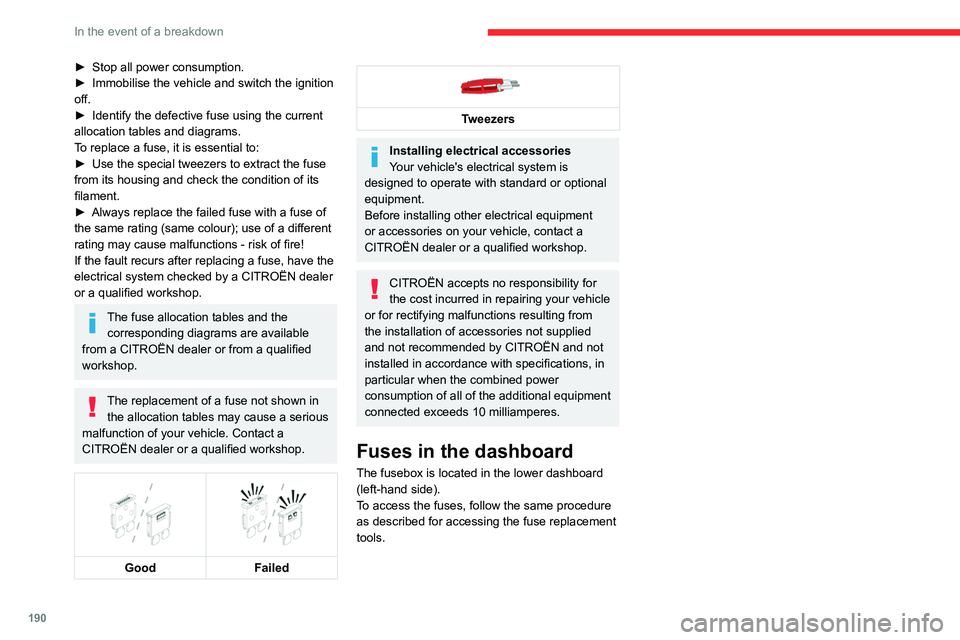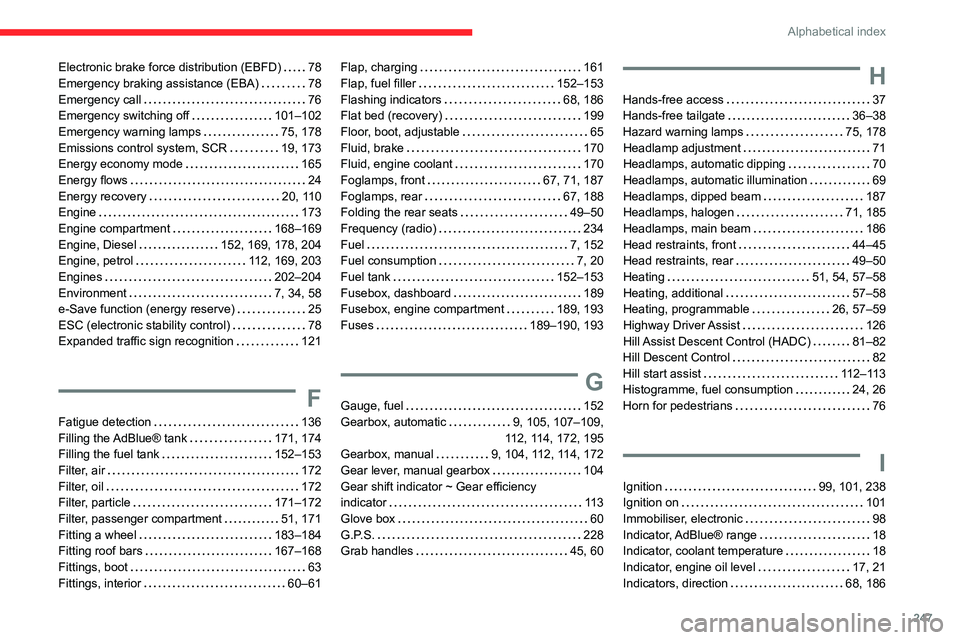dashboard CITROEN C5 AIRCROSS DAG 2022 Handbook (in English)
[x] Cancel search | Manufacturer: CITROEN, Model Year: 2022, Model line: C5 AIRCROSS DAG, Model: CITROEN C5 AIRCROSS DAG 2022Pages: 276, PDF Size: 7.92 MB
Page 192 of 276

190
In the event of a breakdown
► Stop all power consumption.
► Immobilise the vehicle and switch the ignition
off.
►
Identify the defective fuse using the current
allocation tables and diagrams.
T
o replace a fuse, it is essential to:
►
Use the special tweezers to extract the fuse
from its housing and check the condition of its
filament.
►
Always replace the failed fuse with a fuse of
the same rating (same colour); use of a different
rating may cause malfunctions - risk of fire!
If the fault recurs after replacing a fuse, have the
electrical system checked by a CITROËN dealer
or a qualified workshop.
The fuse allocation tables and the corresponding diagrams are available
from a CITROËN dealer or from a qualified
workshop.
The replacement of a fuse not shown in the allocation tables may cause a serious
malfunction of your vehicle. Contact a
CITROËN dealer or a qualified workshop.
Good
Failed
Tweezers
Installing electrical accessories
Your vehicle's electrical system is
designed to operate with standard or optional
equipment.
Before installing other electrical equipment
or accessories on your vehicle, contact a
CITROËN dealer or a qualified workshop.
CITROËN accepts no responsibility for
the cost incurred in repairing your vehicle
or for rectifying malfunctions resulting from
the installation of accessories not supplied
and not recommended by CITROËN and not
installed in accordance with specifications, in
particular when the combined power
consumption of all of the additional equipment
connected exceeds 10 milliamperes.
Fuses in the dashboard
The fusebox is located in the lower dashboard
(left-hand side).
To access the fuses, follow the same procedure
as described for accessing the fuse replacement
tools.
Lower fusebox
Fuse No. Rating
(Amps) Functions
F4 15Horn.
F6 20Front and rear screenwash pump.
F7 10Rear 12 V USB socket.
F8 20Rear wiper.
F10 30Locking/unlocking of the doors and fuel filler flap.
F14 5Alarm (unit).
F18 5Trailer power supply.
F28 5Alarm (siren), additional heating/ventilation remote control receiver.
F29 20Touch screen (CITROËN Connect Radio or CITROËN Connect Nav).
Page 208 of 276

206
Technical data
Dimensions (mm)
These dimensions have been measured on an unladen vehicle.
* Mirrors folded in.
** Version with longitudinal bars.
Identification markings
Various visible markings for the identification and
research of your vehicle.
A. Vehicle identification number (VIN), under
the bonnet.
Stamped on the chassis.
B. Vehicle identification number (VIN), on the
dashboard.
On a label, visible through the windscreen.
C. Manufacturer's label.
Fixed at the right-hand door.
Bears the following information:
–
Manufacturer
’s name.
–
European whole vehicle type approval
number
.
–
V
ehicle identification number (VIN).
–
Gross vehicle weight (GVW).
–
Gross train weight (GTW).
–
Maximum weight on the front axle.
–
Maximum weight on the rear axle.
D. T
yres / paint code label.
Fixed at the driver-side door.
Bears the following information about the tyres:
–
tyre pressures, unladen and laden.
–
tyre specification, made up of the dimensions
and type as well as the load and speed indices.
–
spare tyre inflation pressure.
Also indicates the paint colour code.
The vehicle may be originally equipped with tyres with higher load and speed
indices than those indicated on the label,
without affecting tyre pressure (on cold tyres).
Page 249 of 276

247
Alphabetical index
Electronic brake force distribution (EBFD) 78
Emergency braking assistance (EBA)
78
Emergency call
76
Emergency switching off
101–102
Emergency warning lamps
75, 178
Emissions control system, SCR
19, 173
Energy economy mode
165
Energy flows
24
Energy recovery
20, 110
Engine
173
Engine compartment
168–169
Engine, Diesel
152, 169, 178, 204
Engine, petrol
112, 169, 203
Engines
202–204
Environment
7, 34, 58
e-Save function (energy reserve)
25
ESC (electronic stability control)
78
Expanded traffic sign recognition
121
F
Fatigue detection 136
Filling the AdBlue® tank
171, 174
Filling the fuel tank
152–153
Filter, air
172
Filter, oil
172
Filter, particle
171–172
Filter, passenger compartment
51, 171
Fitting a wheel
183–184
Fitting roof bars
167–168
Fittings, boot
63
Fittings, interior
60–61
Flap, charging 161
Flap, fuel filler
152–153
Flashing indicators
68, 186
Flat bed (recovery)
199
Floor, boot, adjustable
65
Fluid, brake
170
Fluid, engine coolant
170
Foglamps, front
67, 71, 187
Foglamps, rear
67, 188
Folding the rear seats
49–50
Frequency (radio)
234
Fuel
7, 152
Fuel consumption
7, 20
Fuel tank
152–153
Fusebox, dashboard
189
Fusebox, engine compartment
189, 193
Fuses
189–190, 193
G
Gauge, fuel 152
Gearbox, automatic
9, 105, 107–109,
112, 114, 172, 195
Gearbox, manual
9, 104, 112, 114, 172
Gear lever, manual gearbox
104
Gear shift indicator ~ Gear efficiency
indicator
11 3
Glove box
60
G.P.S.
228
Grab handles
45, 60
H
Hands-free access 37
Hands-free tailgate
36–38
Hazard warning lamps
75, 178
Headlamp adjustment
71
Headlamps, automatic dipping
70
Headlamps, automatic illumination
69
Headlamps, dipped beam
187
Headlamps, halogen
71, 185
Headlamps, main beam
186
Head restraints, front
44–45
Head restraints, rear
49–50
Heating
51, 54, 57–58
Heating, additional
57–58
Heating, programmable
26, 57–59
Highway Driver Assist
126
Hill Assist Descent Control (HADC)
81–82
Hill Descent Control
82
Hill start assist
112–113
Histogramme, fuel consumption
24, 26
Horn for pedestrians
76
I
Ignition 99, 101, 238
Ignition on
101
Immobiliser, electronic
98
Indicator, AdBlue® range
18
Indicator, coolant temperature
18
Indicator, engine oil level
17, 21
Indicators, direction
68, 186